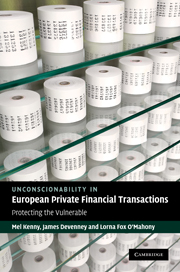Introduction: conceptualising unconscionability in Europe
Published online by Cambridge University Press: 06 August 2010
Summary
Unconscionability is not a simple, easily defined concept. While unconscionability even within the common law is essentially contested, in Europe unconscionability or its equivalents is an even broader concept which is to be found in a plurality of sources; it is therefore perhaps best described as a multi-dimensional concept taking its place in a polycontextual environment of national contract laws and instruments aimed at protecting the vulnerable in a variety of contexts: arising variously in consumer, family or non-professional transactions. Traditionally, in some private law systems, unconscionability may only be resorted to sparingly, as an exception to the fundamental principle of freedom of contract; in others it may be resorted to more widely as an instrument of ensuring ideas of fairness or solidarity between contracting parties. Similarly, the concept may involve stringent procedural or more invasive substantive approaches; and the effective level of protection produced by either of these approaches may vary considerably. In yet other legal orders and within those orders in specific fields of law unconscionability may be delivered indirectly through the intervention of substantive constitutional law (fundamental rights) or, alternatively, and less spectacularly, through property law principles. Some form of unconscionability or its equivalent may thus be found in all European legal orders.
This book represents the results drawn and developed from the conference ‘Conceptualising Unconscionability in Europe’, an event held at Durham Castle on 8–9 September 2008.
- Type
- Chapter
- Information
- Unconscionability in European Private Financial TransactionsProtecting the Vulnerable, pp. 1 - 4Publisher: Cambridge University PressPrint publication year: 2010



